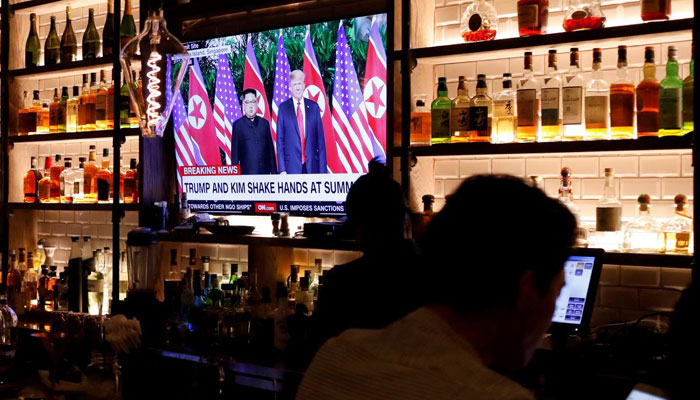Half of Americans back Trump's handling of North Korea : Reuters/Ipsos poll
June 14, 2018

WASHINGTON/NEW YORK: Just over half of all Americans say they approve of how President Donald Trump has handled North Korea, but only a quarter think that his summit this week with Kim Jong Un will lead to the denuclearization of the Korean peninsula, according to a Reuters/Ipsos opinion poll released on Wednesday.
In a joint declaration following their meeting in Singapore on Tuesday, the North Korean leader pledged to move toward complete denuclearization of the peninsula and Trump vowed to guarantee the security of the United States’ old foe. Forty percent of those polled said they did not believe the countries would stick to their commitments.
Another 26 percent said they believed the United States and North Korea would meet their commitments, while 34 percent said they did not know whether they would follow through.
Thirty-nine percent believe the summit has lowered the threat of nuclear war between the United States and nuclear-armed North Korea, slightly more than the 37 percent who said they did not believe it changed anything.
Trump has pursued what he calls a “maximum pressure” campaign” against Pyongyang to force it to give up its nuclear weapons. He toughened up international sanctions to further isolate North Korea and then agreed to meet directly with Kim after South Korea’s president convinced him that the North was committed to giving up its nuclear weapons.
The Reuters/Ipsos poll suggests the Republican president has broad support for one of his biggest foreign policy efforts, despite criticism from non-proliferation experts that Trump had exacted few concrete commitments from Kim on Tuesday on dismantling his nuclear arsenal.
Republicans appear much more enthusiastic than Democrats about the potential benefits of the summit. The poll found that Republicans were twice as likely as Democrats to say that the meeting lowered the threat of nuclear war, and they were three times as likely to say that both sides would follow through on their commitments.
Democrats typically give Trump low approval ratings - only 12 percent approve of his overall job performance. But about 30 percent said they approved of his handling of North Korea.
Trump, who returned to Washington early on Wednesday, hailed the meeting with Kim, the first between a sitting U.S. president and a North Korean leader, as a success that had removed the North Korean nuclear threat. Their seemingly friendly meeting was in sharp contrast to their tit-for-tat insults and bellicose rhetoric late last year while Pyongyang carried out its biggest nuclear and missile tests.
In the poll, Trump received a 51 percent approval rating for his handling of North Korea and also led the list of leaders who should take the most credit for the summit and the joint pledge. Forty percent say the former real estate developer should take the most credit, followed by South Korean President Moon Jae-in
MIGHT IMPACT VOTERS
Trump has repeatedly touted his role in bringing the reclusive North Korea to the negotiating table, a feat that he says his predecessors were unable to pull off.
It may be too soon though to know whether Trump’s diplomatic breakthrough will help Republican candidates in congressional elections in November, when Democrats will attempt to retake control of both houses. Typically foreign policy is not a major concern for mid-term voters.
“It’s too early to say if there is a net positive out of that,” said Republican strategist Alice Stewart. “It’s a good step to have the conversation but that doesn’t yet mean that it’s a success.”
Ron Bonjean, also a Republican strategist, said voters were more likely to be influenced if there was serious and measurable progress closer to the election.
The Reuters/Ipsos opinion poll was conducted online in English, between June 12-13 in the United States. It gathered responses from more than 1,000 adults, including more than 400 Democrats and 400 Republicans.
It has a credibility interval, a measure of the poll’s precision, of 4 percentage points for the full sample and 6 percentage points for the Democrats and Republicans, meaning that the results could vary in either direction by that amount.











